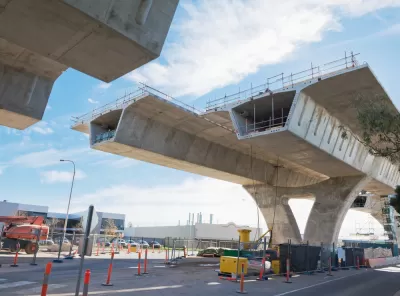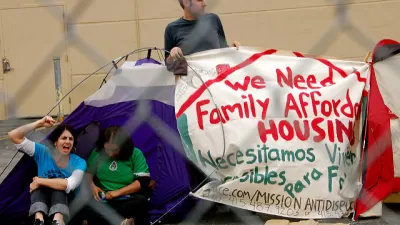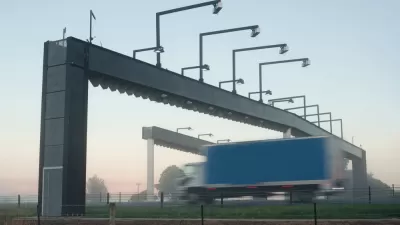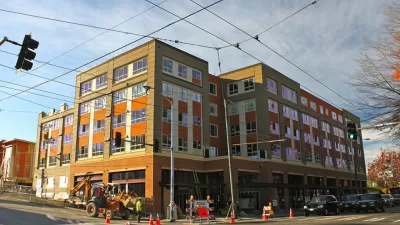The Tax Cut and Jobs Act would have a deleterious effect on major infrastructure proposed by the private sector. The loss of Private Activity Bonds would hike borrowing rates for road, transit, stadium, and even affordable housing projects.

Along with ending the federal plug-in electric vehicle credit that impacts the budding clean car industry and capping mortgage and property tax deductions affecting homebuilding, H.R. 1: Tax Cuts and Jobs Act, would have an outsized-effect on major infrastructure projects largely financed by the private sector by ending the use of tax-exempt Private Activity Bonds (PABs) and related tax-exempt bonds.
Florida's new $3 billion Brightline train service, set to begin 125 m.p.h. between Miami, Fort Lauderdale, and West Palm Beach by the end of the year, had hoped to use $1.75 billion in private activity bonds, but couldn't sell the bonds. The new amount is $600 million, reports TC Palm on Oct. 30.
Would the elimination of PABs hurt the Texas Central railway, a true high-speed rail project that will be entirely privately financed? An August 2015 Dallas Observer article suggested that PABs would not be used, but the door wasn't entirely closed to them either.
PABs are used for road projects as well, specifically express (toll) lanes built by public-private partnerships, like Virginia's New 395 Express Lanes.
The U.S. Department of Transportation's Build America Bureau, "responsible for driving transportation infrastructure development projects in the United States," indicates that the PAB 'pipeline' through Jan. 23, 2017 amounted to $10,860,952.
"There will be a concerted effort by advocates to get the provision removed from the bill, said Robert Poole, director of transportation policy at the Reason Foundation, a free-market research group," reports Bloomberg News on Nov. 2.
“This would be completely at odds with getting more private investment in infrastructure,” Poole said.
Not just transportation
Eliminating tax-exempt bonds "could jeopardize financing plans for the proposed $1.9 billion Las Vegas Raiders stadium project," reports Richard N. Velotta for the Las Vegas Review-Journal on Nov. 3. "The financing package includes a $750 million public contribution that would be financed through tax-exempt bonds."
Payton Chung of Greater Greater Washington explains on Nov. 6 how the bonds' disappearance would impact mixed-income apartment construction which use the bonds to both reduce borrowing rates and "generate a four percent Low Income Housing Tax Credit (LIHTC) that developers can use as part of the down payment on their loan."
Most of the new multifamily construction in Wards 7 and 8 and at public housing redevelopment sites is financed with the DC Housing Finance Authority's Multifamily Mortgage Revenue Bond program.
Chung goes on to describe the widespread use of PABs in the D.C. area, at airports, rail stations, office buildings, and museums, to name just a few.
For a wider look at the different types of tax-exempt bond funds that may be eliminated by H.R. 1, see Brookings Institution reports:
- "Building better infrastructure with better bonds,"
- "Why the federal government should stop spending billions on private sports stadiums," Alexander K. Gold, Austin J. Drukker, and Ted Gayer, September 8, 2016. The report concludes:
An alternative approach would be to limit, rather than eliminate, the federal tax subsidy by mandating tax-exempt stadium bonds be deemed “qualified private activity bonds,” which are subject to a statewide volume cap.
Hat tip to Clyde Anderson.
FULL STORY: The GOP tax plan would make housing and infrastructure more expensive

Alabama: Trump Terminates Settlements for Black Communities Harmed By Raw Sewage
Trump deemed the landmark civil rights agreement “illegal DEI and environmental justice policy.”

Study: Maui’s Plan to Convert Vacation Rentals to Long-Term Housing Could Cause Nearly $1 Billion Economic Loss
The plan would reduce visitor accommodation by 25% resulting in 1,900 jobs lost.

Planetizen Federal Action Tracker
A weekly monitor of how Trump’s orders and actions are impacting planners and planning in America.

Waymo Gets Permission to Map SF’s Market Street
If allowed to operate on the traffic-restricted street, Waymo’s autonomous taxis would have a leg up over ride-hailing competitors — and counter the city’s efforts to grow bike and pedestrian on the thoroughfare.

Parklet Symposium Highlights the Success of Shared Spaces
Parklets got a boost during the Covid-19 pandemic, when the concept was translated to outdoor dining programs that offered restaurants a lifeline during the shutdown.

Federal Homelessness Agency Places Entire Staff on Leave
The U.S. Interagency Council on Homelessness is the only federal agency dedicated to preventing and ending homelessness.
Urban Design for Planners 1: Software Tools
This six-course series explores essential urban design concepts using open source software and equips planners with the tools they need to participate fully in the urban design process.
Planning for Universal Design
Learn the tools for implementing Universal Design in planning regulations.
Caltrans
Smith Gee Studio
Institute for Housing and Urban Development Studies (IHS)
City of Grandview
Harvard GSD Executive Education
Toledo-Lucas County Plan Commissions
Salt Lake City
NYU Wagner Graduate School of Public Service





























